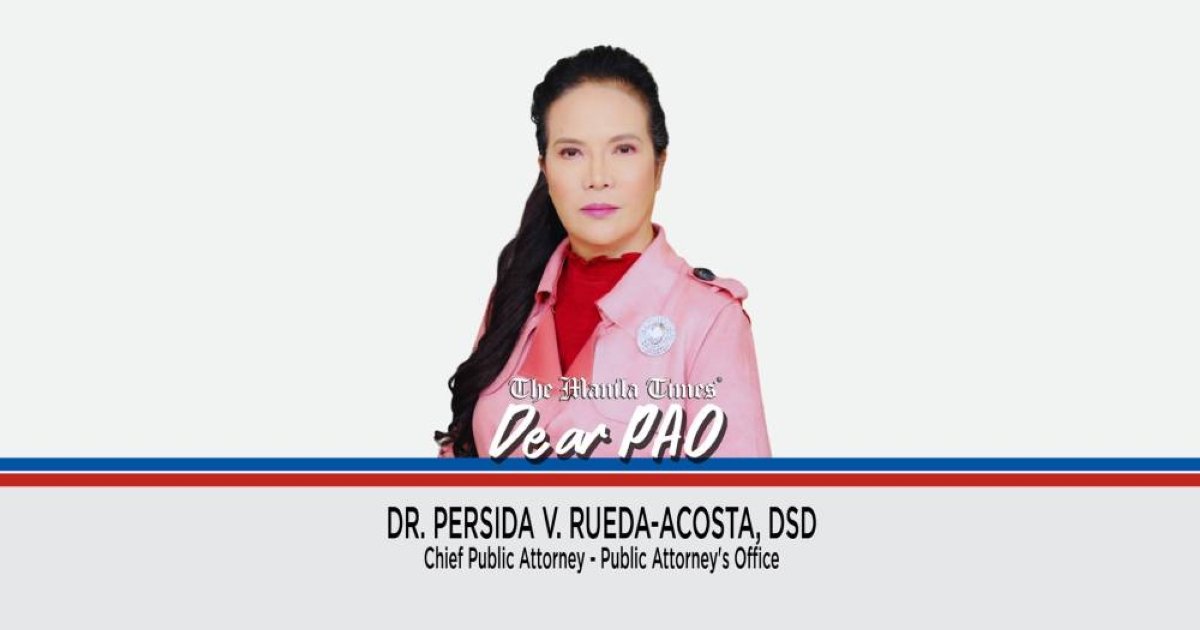Dear PAO,
I incurred a loan from my friend with a monthly interest rate of 2 percent. I have been paying my monthly installment from January 2020 until February 2024. Per our agreement, I am supposed to pay the installment in cash at her residence. However, in March 2024, when I went to her house to pay, I was informed that my friend had gone on an out-of-country trip. I tried to call her, but she would not answer my calls. A few days ago, her daughter came to my house to collect the payment, but she did not present any documents to prove that she was authorized to collect for her mother. The following day, my friend’s sister also went to our house and asked for the payment, but she also did not show any documents to prove her authority to receive payment on behalf of my friend. What can I do to pay my monthly installment to avoid the extension of the loan term and the imposition of further interest?
Nelia
Dear Nelia,

Please be informed that one of the modes of extinguishment of an obligation is payment or performance. In case of payment, the law provides the instances when consignation before the courts may be considered as payment, in so far as it operates to extinguish an existing obligation. Article 1256 of the New Civil Code of the Philippines provides the following:
“Article 1256. If the creditor to whom tender of payment has been made refuses without just cause to accept it, the debtor shall be released from responsibility by the consignation of the thing or sum due.
Consignation alone shall produce the same effect in the following cases:
“(1) When the creditor is absent or unknown, or does not appear at the place of payment;
“(2) When he is incapacitated to receive the payment at the time it is due;
“(3) When, without just cause, he refuses to give a receipt;
“(4) When two or more persons claim the same right to collect;
“(5) When the title of the obligation has been lost.” (Emphasis supplied)
The rule on payment by consignation was laid down by the Supreme Court in the case of Soledad Dalton vs. FGR Realty and Development Corporation et al. (GR 172577, Jan. 19, 2011, through Associate Justice Antonio Carpio), viz.:
“In Insular Life Assurance Company, Ltd. v. Toyota Bel-Air, Inc., the Court enumerated the requisites of a valid consignation: (1) a debt due; (2) the creditor to whom tender of payment was made refused without just cause to accept the payment, or the creditor was absent, unknown or incapacitated, or several persons claimed the same right to collect, or the title of the obligation was lost; (3) the person interested in the performance of the obligation was given notice before consignation was made; (4) the amount was placed at the disposal of the court; and (5) the person interested in the performance of the obligation was given notice after the consignation was made.”
Pursuant to the aforementioned provision of the law, and the decision of the Supreme Court, considering that your creditor is absent at the agreed place of payment and that two persons are claiming the right to collect your debt, you can deposit the amounts due in Court, provided that the following requirements are met in your case: (1) your debt is due; (2) your creditor is absent, or that several persons are claiming entitlement to receive the payment; (3) you notified your creditor of your intent to consign the payment before the court; (4) the amount due for payment was deposited before the court; and (5) that after the consignation, you notified your creditor of such an act. The Supreme Court has clearly stated that the non-fulfillment of the said requirements may cause the invalidity of your deposit in court or consignment of any amount.
We hope that we were able to answer your queries. This advice is based solely on the facts you have narrated and our appreciation of the same. Our opinion may vary when other facts are changed or elaborated on.
Editor’s note: Dear PAO is a daily column of the Public Attorney’s Office. Questions for Chief Acosta may be sent to [email protected]









